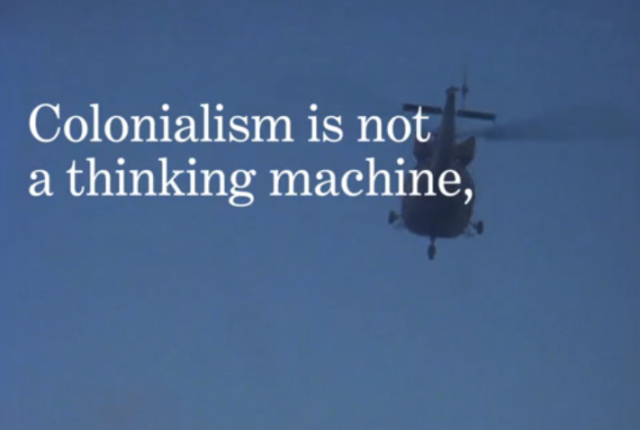
Documentary uses Swedish archival footage and the words of Frantz Fanon to tell story of colonization and decolonization
CONCERNING VIOLENCE (Göran Hugo Olsson, 2014)
IFC Center
323 Sixth Ave. at Third St.
December 5-11
212-924-7771
www.ifccenter.com
www.facebook.com/concerningviolence
 Swedish filmmaker Göran Hugo Olsson brings physician and psychiatrist Frantz Fanon’s seminal 1961 book, The Wretched of the Earth, to bold, vivid life in the empowering documentary Concerning Violence: Nine Scenes from the Anti-Imperialistic Self-Defense. “Every one of us must think for himself — always provided that he thinks at all; for in Europe today, stunned as she is by the blows received by France, Belgium, or England, even to allow your mind to be diverted, however slightly, is as good as being the accomplice in the crime of colonialism,” French philosopher Jean-Paul Sartre wrote in the lengthy preface to the book. For Concerning Violence, Olsson called on Columbia University professor Gayatri Chakravorty Spivak to provide a heavily academic introduction, setting the stage for nine examples of the relationship between settlers and natives, Europeans and Africans, in the 1960s, ’70s, and ’80s. As he did with his previous film, The Black Power Mixtape 1967-1975, Olsson uses amazing footage taken by Swedish journalists, including interviews with Christian missionaries, Zimbabwe president Robert Mugabe, reporter Gaetano Pagano, Burkina Faso president Thomas Sankara, black revolutionaries, and privileged white men, combining those stunning images with strong statements from Fanon’s treatise, read by Ms. Lauryn Hill and blasted across the screen in big letters. “Colonialism is not a thinking machine, nor a body endowed with reasoning faculties. It is violence in its natural state, and it will only yield when confronted with greater violence,” Hill states in a steady voice. “Decolonization is always a violent phenomenon. Decolonization is a historical process. It cannot be understood, it cannot become clear to itself except by the movements which give it historical form and content. Decolonization, which sets out to change the order of the world, is, obviously, a program of complete disorder.”
Swedish filmmaker Göran Hugo Olsson brings physician and psychiatrist Frantz Fanon’s seminal 1961 book, The Wretched of the Earth, to bold, vivid life in the empowering documentary Concerning Violence: Nine Scenes from the Anti-Imperialistic Self-Defense. “Every one of us must think for himself — always provided that he thinks at all; for in Europe today, stunned as she is by the blows received by France, Belgium, or England, even to allow your mind to be diverted, however slightly, is as good as being the accomplice in the crime of colonialism,” French philosopher Jean-Paul Sartre wrote in the lengthy preface to the book. For Concerning Violence, Olsson called on Columbia University professor Gayatri Chakravorty Spivak to provide a heavily academic introduction, setting the stage for nine examples of the relationship between settlers and natives, Europeans and Africans, in the 1960s, ’70s, and ’80s. As he did with his previous film, The Black Power Mixtape 1967-1975, Olsson uses amazing footage taken by Swedish journalists, including interviews with Christian missionaries, Zimbabwe president Robert Mugabe, reporter Gaetano Pagano, Burkina Faso president Thomas Sankara, black revolutionaries, and privileged white men, combining those stunning images with strong statements from Fanon’s treatise, read by Ms. Lauryn Hill and blasted across the screen in big letters. “Colonialism is not a thinking machine, nor a body endowed with reasoning faculties. It is violence in its natural state, and it will only yield when confronted with greater violence,” Hill states in a steady voice. “Decolonization is always a violent phenomenon. Decolonization is a historical process. It cannot be understood, it cannot become clear to itself except by the movements which give it historical form and content. Decolonization, which sets out to change the order of the world, is, obviously, a program of complete disorder.”
The nine “chapters” take viewers to Angola, Rhodesia, Liberia, Tanzania, Mozambique, Guinea-Bissau, and other current or former African nations, examining institutional racism, wealth and poverty, illegal imprisonment, guerrilla revolutions, the IMF, and the lurking “monster” that is the United States. It draws a brutal, powerful picture that pulls no punches, with expert use of archival footage never seen outside of Sweden. “There is no native who does not dream at least once a day of setting himself up in the settler’s place,” Ms. Hill reads, the words still ringing true today as riots and protests spread throughout the United States and civil wars continue in Africa and other continents. More than fifty years after its publication, The Wretched of the Earth is still a call to action, albeit one steeped in violence, as one can debate how much things have really changed. “The films in the Swedish Archive might have been part of a patronizing perspective at the time, but thirty years later, we think they reveal something important about this time to Europeans, Americans, and Africans — as well as others across the world who have been on either side of colonization, or are experiencing it now,” Olsson points out in his director’s statement. Concerning Violence opens December 5 at the IFC Center, with Olsson participating in Q&As following the 6:00 shows on Friday and Saturday.